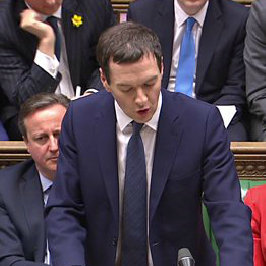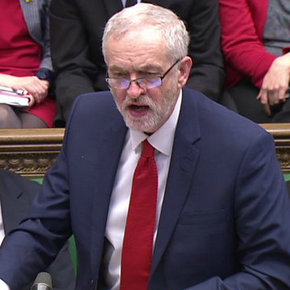
Buildingtalk summary of Budget 2016 + industry reaction
 Howard Chapman, Buildingtalk Editor
Howard Chapman, Buildingtalk Editor
Buildingtalk summary of George Osborne’s Budget 2016 plus industry reaction to business tax changes and infrastructure spending + the final word from Jeremy Corbyn.
Well, George Osborne hasn’t long sat down after delivering his 8th Budget. The most notable thing was the absence of of any surprise. George normally pulls a little rabbit out of the dispach box to keep us all amused and provide a headline – but not this year.
From an industry perspective, the fuel duty freeze was welcome, as were the cuts in corporation tax and the increase in small business tax relief which will exempt thousands of firms.
The Northern Powerhouse got top billing – not suprising as it forms part of his pitch for David Cameron’s job. But significant spending on infrastructure including railways and roads will boost construction opportunities. Additional flood defence spending is also welcome.
The Chancellor’s speech was 9,223 words long and the ‘Next generation’ was a key theme and a phrase used 18 times.
The quick summary below gives you the highlights – and are followed by the first industry reactions. I will add more as I get them or you can post your comments below.
Forecasts
- growth forecasts revised down for next 3 years
- UK will grow faster than any other major Western economy
- million jobs to be created by 2020
- inflation 0.7% forecast for 2016
- debt to be £9bn lower in 2015-16 in cash terms
- deficit as a share of GDP is projected to fall 1% in 2018-19
Action
- sugar tax on soft drinks to raise , raising £520m for primary school sport
- all schools in England to become academies by 2022
- further spending cuts of £3.5bn by 2020
- Capital Gains Tax to be cut from 28% to 20%
- 1% rise in insurance premium tax
- tobacco tax up 2% above inflation
- fuel duty freeze for the sixth consecutive year
Business Taxes
- corporation tax (currently 20%) to fall to 17% by 2020
- anti-tax avoidance/evasion to raise £12bn by 2020
- £9bn raised by closing corporate tax loopholes and tax minimisation schemes
- small business tax relief up from £6,000 to £15,000 – exempts thousands of firms
Infrastructure
- green light for new rail lines including Crossrail 2 in London and the HS3 link between Manchester and Leeds
- £230m for road improvements in north of England including M62
- £700m for flood defences schemes
- tolls on Severn River crossings to be halved by 2018
- 0.5% rise in insurance premium tax, with the money being spent on funding flood defences including new projects in Cumbria and Yorkshire
UK unemployment statistics (Office for National Statistics)
- unemployment down 28,000 from the previous quarter
- fell to 1.68 million between November and January
- rate of unemployment remained at 5.1%,
- maintains a decade-low rate
- 31.42 million are in work
- 478,000 more people in work than one year ago
- employment rate is 74.1%
- joint highest employment rate since current records began in 1971
- average earnings up 2.1% in the year to January
Industry comments
Fuel Duty freeze
AA president Edmund King: “We are delighted that the Chancellor has resisted the temptation to increase fuel duty, which will bring relief at the pumps for millions of motorists.”
RAC chief engineer David Bizley: “Motorists will be relieved that the Chancellor has not used low fuel prices as an opportunity to raise duty on petrol and diesel to help reduce the deficit.”
James Hookham, Freight Transport Association, Managing Director of Policy and Communications: “A further freeze of duties is welcome but the Chancellor missed a chance to give a boost to the stuttering economy by reducing the tax on an essential business input. Reducing road fuel duty would ease cost pressure on businesses operating commercial vehicles and stimulate economic growth”.
Infrastructure and flood defenses
Patricia Moore, UK head of infrastructure for Turner & Townsend: “Future spending on transport projects such as HS3, a new tunnel between Manchester and Sheffield, and upgrades to the M62 and main A66 and A69 roads, will all help stimulate and reinvigorate the economy in the North providing a much-needed boost to jobs and trade.This budget is a clear sign that George Osborne means business for the Northern Powerhouse”.
Alex Hirom, Construction and Engineering Partner at Bond Dickinson LLP said: “This is a good budget for the UK construction sector as the Treasury announces further initiatives to free up land for housebuilding; an increase funding for flood defences through an insurance levy; and a number of major projects including Crossrail 2 in London and Northern Powerhouse projects including HS3. The sector will welcome the Government’s support for a pipeline of projects stretching into the 2020s.”
Housing targets
Brian Berry, Chief Executive of the FMB: “The Government has set itself a target of a million new homes by 2020. Official statistics show that annual housing completions in England totalled just over 140,000 in 2015, a long way short of the 200,000 homes. Government is working on a number of fronts to speed up the planning process and intervene to support first time buyers, and some of the measures in today’s Budget are welcome. Yet these announcements are limited – we cannot afford to lose momentum in the battle to beat the housing crisis.”
Housing and sustainability
Iain McIlwee, Chief Executive, British Woodworking Federation: “We are also sceptical about the Government’s commitment to deliver 400,000 affordable housing starts. It sounds positive, but in reality it is less of a commitment than a vague hope. We need a steady flow of affordable housing onto the market and realistically this needs to be driven by direct government investment. A final concern is not just the absence but the derision with which the Chancellor is treating environmental issues. This fundamentally undermines his assertion this is a Budget that puts the next generation first. This may yet be the legacy for which he is really remembered.”
Laura Smith, CBI Head of Construction and Manufacturing, said: “The Government’s announcements on opening up the planning system and fast tracking the release of public sector land demonstrates its focus on housing. However, a vibrant and healthy housing market requires a mix of tenures. The decision to apply higher Stamp Duty to larger investors will damage the UK’s emerging Build to Rent sector and risks undermining progress on building enough new homes.”
 And the final word to Jeremy Corbyn, Labour leader: “It’s a recovery built on sand on a Budget of failure”.
And the final word to Jeremy Corbyn, Labour leader: “It’s a recovery built on sand on a Budget of failure”.
2 comments on “Buildingtalk summary of Budget 2016 + industry reaction”
Leave a Reply
You must be logged in to post a comment.
Latest news

26th July 2024
Enfield Speciality Doors completes world-class project for Atlas Copco HQ
A rundown office and warehouse building completely transformed into a modern headquarters for Atlas Copco has been fitted with more than 120 internal fire doors from Enfield Speciality Doors.
Posted in Access Control & Door Entry Systems, Articles, Building Industry News, Building Products & Structures, Building Systems, Case Studies, Doors, Interior Design & Construction, Interiors, Posts, Restoration & Refurbishment, Retrofit & Renovation, Security and Fire Protection, Sustainability & Energy Efficiency, Timber Buildings and Timber Products, Wooden products
26th July 2024
Abloy UK launches new white paper
Abloy UK, a leading provider of security and access control solutions, has launched a new white paper.
Posted in Access Control & Door Entry Systems, Architectural Ironmongery, Articles, Building Industry News, Building Products & Structures, Building Services, Doors, Facility Management & Building Services, Health & Safety, Information Technology, Innovations & New Products, Publications, Research & Materials Testing, Security and Fire Protection
26th July 2024
MCRMA Member Profile: David Roy, Director of Roofconsult
David Roy of MCRMA member company Roofconsult has more than 50 years’ experience to draw upon working in the building envelope sector and a unique perspective on how it has changed in that time.
Posted in Articles, BIM, Infrastructure & CAD Software, Building Associations & Institutes, Building Industry News, Building Products & Structures, Building Services, Building Systems, Cladding, Information Technology, Restoration & Refurbishment, Retrofit & Renovation, Roofs, Walls
26th July 2024
Strand: Enhancing Door Functionality and Safety
Craig Fox, Sales Director for Strand Hardware, outlines how door industry professionals might apply door limiting stays…
Posted in Architectural Ironmongery, Articles, Building Industry News, Building Products & Structures, Building Services, Doors, Facility Management & Building Services, Health & Safety, Restoration & Refurbishment, Retrofit & Renovation

16 March 2016 3.42pm
Annie Mauger, Chartered Institute of Housing in Scotland :
“There were no big surprises in today’s budget but there will be big implications for people living across the UK. Further cuts, such as the changes to Personal Independence Payment announced last week and affirmed by the Chancellor today, will make it more difficult to support some of the most vulnerable people in our communities to meet basic living costs. While housing policy is already devolved to the Scottish Government and further powers over taxation, borrowing and social security are due to be transferred through the Scotland Bill, there will be no quick, easy fixes. This latest announcement sets even greater challenges for the next Scottish Government.”
Richard Abadie, PwC transport and infrastructure partner, comments on plans to keep UK moving – on the road or on tracks.
“We welcome the funding announced for further analysis of the Trans-Pennine tunnel, HS3 and Crossrail 2. This should help provide clarity around the commercial, technical and environmental feasibility of the projects. Nonetheless, there is still a long way to go on these projects and it would be misleading and premature for anyone to think they have either been approved or are proceeding. Like with any mega-projects, these three projects have significant hurdles to overcome and this will take time. In recent years we’ve seen a growing trend towards complex transport mega-projects which are expensive to procure, difficult to manage and govern and limit the ability to transfer risk away from the taxpayer and user to the suppliers. This shift also disadvantages small and medium enterprises (SMEs) which struggle to participate in these kind of mega-projects. Properly managing the supply chain and affording proper competition is critical to broad-based wealth creation and economic growth.The long lead time on mega-projects also means announcements now don’t lead to job creation and economic growth any time soon, nor does the Treasury need to set aside substantial money to pay for the projects in the current parliament. So, in the round, what we have is a little money to further project assessments, but limited hard and fast commitment to delivering the projects nor any significant near term economic impact.”